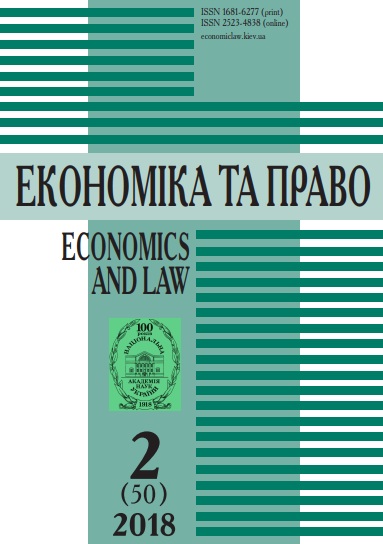ВИБІР КРИТЕРІЇВ ОЦІНКИ ЕФЕКТИВНОСТІ ПОЛІТИКИ ПІДТРИМКИ ВІДНОВЛЮВАНИХ ДЖЕРЕЛ ЕНЕРГІЇ
DOI:
https://doi.org/10.15407/econlaw.2018.02.140Ключові слова:
критерій еко-номічної ефективності, ін-ди катор загальних витрат, критерій справедливості, по-літика підтримки від нов лю-ваних джерел енергії, ВДЕАнотація
Обґрунтовано вибір критеріїв оцінки ефективності політики підтримки відновлюваних джерел енергії, а саме критерій економічної ефективності, у складі якого виділено статичну і динамічну ефективність. Представлено розрахунок та обґрунтування використання індикаторів компенсації, що характеризують цей критерій. Проаналізовано й оцінено критерій справедливості, порівняно використання представлених індикаторів політичної підтримки відновлюваних джерел енергії. Визначено параметри залежності динамічної ефективності.
Посилання
Chapter 11. Policy, Financing and Implementation. Renewable Energy Sources and Climate Change Mitigation Special Report of the Intergovernmental Panel on Climateю Change. Cambridge University Press, 2011. P. 865—950. DOI: https://doi.org/10.1017/CBO9781139151153.015
Verbruggen A., Lauber V. Assessing the performance of renewable electricity support instruments. Energy Policy. 2012. Vol. 45. P. 635—644. doi: https://doi.org/10.1016/j.enpol.2012.03.014
Deploying Renewables: Principles for Effective Policies. The International Energy Agency (IEA). Paris, 2008. 250 p.
Deploying Renewables 2011: Best and Future Policy Practice, Renewable Energy Markets and Policies. The International Energy Agency (IEA). Paris, 2011. 184 p.
Held A. RE-Shaping: Shaping an effective and efficient European renewable energy market, D5 & D6 Report: Indicators assessing the performance of renewable energy support policies in 27 Member States. 2010. URL: www.reshaping-respolicy.eu/downloads/RE-Shaping%20D5D6_Report_final.pdf (last accessed: 10.04.2018).
Candelise C., Winskel M., Gross, R. The dynamics of solar PV costs and prices as a challenge for technology forecasting’ Renewable and Sustainable: Energy Reviews. 2013. Vol. 26. P. 96-107. DOI: https://doi.org/10.1016/j.rser.2013.05.012
Pablo D. The dynamic efficiency of feed-in tariffs: The impact of different design elements. Energy Policy. 2012. Vol. 41. P. 139—151. doi: https://doi.org/10.1016/j.enpol.2011.08.029
Shukla P.R. Justice, Equity and Efficiency in Climate Change: A Developing Country Perspective. Chapter 9, Fairness Concerns in Climate Change Ference Toth (Ed), Earthscan Publications, London, 1999. 18 p.
Konidari P., Mavrakis D. A multi-criteria evaluation method for climate change mitigation policy instruments. Energy Policy. 2007. Vol. 35. No. 12. P. 6235—6257. doi: https://doi.org/10.1016/j.enpol.2007.07.007
Fischer C.M., Morgenstern R. Metrics for Evaluating Policy Commitments in a Fragmented World: The Challenges of Equity and Integrity. Harvard Kennedy School, Cambridge, 2008. 29 p.
Jacobson A., Milman A.D., Kammen D.M. Letting the (energy) Gini out of the bottle: Lorenz curves Evaluating Renewable Energy Policy: A Review of Criteria and Indicators for Assessment of cumulative electricity consumption and Gini coefficients as metrics of energy distribution and equity. Energy Policy. 2005. Vol. 33. No. 14. P. 1825—1832. doi: https://doi.org/10.1016/j.enpol.2004.02.017
Bazilian M., Nussbaumer P., Cabraal A. and others. Measuring Energy Access: Supporting a Global Target. Columbia University. New York, 2010. 22 p.
Macintosh A., Wilkinson D. The Australian Government’s solar PV rebate program. An evaluation of its cost-effectiveness and fairness. ANU Centre for Climate Law and Policy. Policy Brief No. 21. 2010. 32 p.


